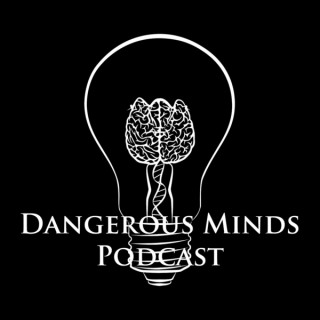Podcasts about cyborg nest
- 8PODCASTS
- 8EPISODES
- 27mAVG DURATION
- ?INFREQUENT EPISODES
- Jun 3, 2022LATEST
POPULARITY
Latest podcast episodes about cyborg nest
Sentero, an Interview with the inventor Livu Babitz, by Zack Hurtz
Show Notes: Join us as Zack sits down with Livu Babitz of Cyborg Nest to discuss the Sentero. Sentero is a piece of wearable tech that connects the user to the world via haptic feedback using vibrations to indicate direction and increase awareness of special orientation. The device also allows you to feel other users heart beats, find the direction of locations around the globe. Want to know what direction to face to find your childhood town? Use Sentero to serve as your guide. You can do the same thing for people, so when your loved one calls you or you're thinking about them Sentero indicates where they are on Earth. If you'd like to contact Liviu or Zack you'll find their contact information below… Liviu Babitz: Founder and CEO of Cyborg Nest liviu@cyborgnest.net Cyborg Nest: https://www.cyborgnest.net/ Zackery Hurtz: Podcast producer Zackery.d.hurtz@gmail.com Find out more at https://wcb-newsline-unleashed.pinecast.co This podcast is powered by Pinecast. Try Pinecast for free, forever, no credit card required. If you decide to upgrade, use coupon code r-af0929 for 40% off for 4 months, and support WCB Newsline Unleashed.
Cyborg Nest’s Liviu Babitz shares his insights into the latest methods for becoming a cyborg, the process behind designing new senses, and how biohacking will change the way we think about human limitations. Liviu Babitz is co-founder and CEO of Cyborg Nest, the world’s first company to sell intelligently designed senses. He believes more is happening around us than we can actually perceive, so he decided to start trying to grasp some of it. As our lives become increasingly afflicted by artificial intelligence – creating smarter phones, cars, and homes – he decided to make people smarter instead. Find out more: futurespodcast.net CREDITS Produced by FUTURES Podcast Recorded, Mixed & Edited by Luke Robert Mason FOLLOW FUTURES PODCAST Twitter: @FUTURESPodcast Instagram: @futurespodcast Facebook: @FUTURESPodcast
The Rise of the CyborgsKatherine is joined by Dr Lesley Ann Daly, research and testing co-ord for Cyborg Nest the 'mindware' company founded by officially recognised cyborgs who are creating a range of artificial senses that they believe are the next step of human evolution. Lesley addresses out fears about terminator though we find out how cyborgs are walking all around us without our realising. Will we soon all might be soon joining them and what will that mean for the next generation.
Frank Swain can hear Wi-Fi. Diagnosed with early deafness aged 25, Frank decided to turn his misfortune to his advantage by modifying his hearing aids to create a new sense. He documented the start of his journey three years ago on Radio 4 in 'Hack My Hearing'. Since then, Frank has worked with sound artist Daniel Jones to detect and sonify Wi-Fi connections around him. He joins a community around the world who are extending their experience beyond human limitations. In 'Meet the Cyborgs' Frank sets out to meet other people who are hacking their bodies. Neil Harbisson and Moon Rebus run The Cyborg Foundation in Barcelona, which welcomes like-minded body hackers from around the world. Their goal is not just to use or wear technology, but to re-engineer their bodies. Frank meets the creators of Cyborg Nest, a company promising to make anyone a cyborg. They have recently launched their first product - The North Sense - a computer chip anchored to body piercings in the chest, which vibrates when it faces north. "I'm a 51 year old bald guy, with no tattoos or piercings" says co-founder Scott Cohen. "This was never a place I thought I'd end up in. Everyone's talking about machine learning, but what we're trying to do is make our brains smarter." Of course, the marriage of technology and biology is commonplace in medicine, from pacemakers to IUDs. But now 'citizen hackers' are modifying their medical equipment to add new functions. Dana Lewis from Seattle has created her own 'artificial pancreas' to help manage her Type 1 diabetes and released the code online. But should limits be placed on self-experimentation? And will cybernetic implants eventually become as ubiquitous as smart phones? Features music composed for The North Sense by Andy Dragazis. Presenter: Frank Swain. Producer: Michelle Martin. First broadcast on Tuesday 31 January, 2017.
dangerous.minds.episode.32.liviu.babitz.cyborg.nest
(This podcast was produced by CLOT Magazine editorial team and Stephen Mclaughlin) What happens if we alter the traditional methods of sensing by adding an extra sense? What changes if we extend our perception and abilities by enhancing our senses? In her A Cyborg Manifesto, written in the early eighties, Dora Haraway defined cyborg as ‘A cybernetic organism, a hybrid of machine and organism, a creature of social reality as well as a creature of fiction. Neil Harbisson, cyborg artist, co-founder of The Cyborg Foundation and Cyborg Nest, ‘became technology’ and therefore cyborg more than a decade ago when he implanted an antenna in his skull that allows him to hear colours. Born with achromatopsia, a rare condition of colour blindness that makes him see the world in a grey scale, the antenna, which Harbisson calls ‘eyeborg’ represents the perfect cybernetic union between human and technology. He even wears it while showering. For Harbisson, the son of a Catalan mother and an Irish father, his identity as a cyborg is official — the antenna is included in his British passport. Harbisson’s cyborg art is mainly focused on creating music and portraits through the new sense. In Piano Concerto No. 1, he painted a piano with different colour paint and then the antenna played the frequencies of the colours while he created portraits in Sound Portraits by listening to the colour of their faces. Another appealing artwork is The Human Colour Wheel, a colour wheel based on the light of the human skins. Apart from his artistic work Neil Harbisson co-founded together with cyborg choreographer Moon Ribas The Cyborg Foundation in 2010. Its aims are to help people to become a cyborg by giving them the tools and the information to achieve their goal. More recently, in 2016, Harbisson and Ribas launched Cyborg Nest. As Neil says, Cyborg Nest is a company that ‘[offers] senses for people. (...) so people can extend their senses by applying or incorporating new sensory organs in their body.’ How would the world appear to us when we sense it in a broad and different new ways? Exploring new ways of communicating beyond our senses and languages of sounds and signs will allow us to comprehend the world in broader dimensions. The world would not be perceived any longer in three dimensions.
Frank Swain can hear Wi-Fi. Diagnosed with early deafness aged 25, Frank decided to turn his misfortune to his advantage by modifying his hearing aids to create a new sense. He documented the start of his journey three years ago on Radio 4 in 'Hack My Hearing'. Since then, Frank has worked with sound artist Daniel Jones to detect and sonify Wi-Fi connections around him. He joins a community around the world who are extending their experience beyond human limitations. In 'Meet the Cyborgs' Frank sets out to meet other people who are hacking their bodies. Neil Harbisson and Moon Rebus run The Cyborg Foundation in Barcelona, which welcomes like-minded body hackers from around the world. Their goal is not just to use or wear technology, but to re-engineer their bodies. Frank meets the creators of Cyborg Nest, a company promising to make anyone a cyborg. They have recently launched their first product - The North Sense - a computer chip anchored to body piercings in the chest, which vibrates when it faces north. But it’s not only new senses that are being developed. Other people are focusing on modifying lifesaving medical devices. Dana Lewis from Seattle has created her own 'artificial pancreas' to help manage her Type 1 diabetes and released the code online. Frank asks - should limits be placed on self-experimentation? And will cybernetic implants eventually become as ubiquitous as smart phones? Features music composed for The North Sense by Andy Dragazis. Image: Row of microchips and capacitors on circuit board, © EyeWire Presenter: Frank Swain Producer: Michelle Martin.
Frank Swain can hear Wi-Fi. Diagnosed with early deafness aged 25, Frank decided to turn his misfortune to his advantage by modifying his hearing aids to create a new sense. He documented the start of his journey three years ago on Radio 4 in 'Hack My Hearing'. Since then, Frank has worked with sound artist Daniel Jones to detect and sonify Wi-Fi connections around him. He joins a community around the world who are extending their experience beyond human limitations. In 'Meet the Cyborgs' Frank sets out to meet other people who are hacking their bodies. Neil Harbisson and Moon Rebus run The Cyborg Foundation in Barcelona, which welcomes like-minded body hackers from around the world. Their goal is not just to use or wear technology, but to re-engineer their bodies. Frank meets the creators of Cyborg Nest, a company promising to make anyone a cyborg. They have recently launched their first product - The North Sense - a computer chip anchored to body piercings in the chest, which vibrates when it faces north. "I'm a 51 year old bald guy, with no tattoos or piercings" says co-founder Scott Cohen. "This was never a place I thought I'd end up in. Everyone's talking about machine learning, but what we're trying to do is make our brains smarter." Of course, the marriage of technology and biology is commonplace in medicine, from pacemakers to IUDs. But now 'citizen hackers' are modifying their medical equipment to add new functions. Dana Lewis from Seattle has created her own 'artificial pancreas' to help manage her Type 1 diabetes and released the code online. But should limits be placed on self-experimentation? And will cybernetic implants eventually become as ubiquitous as smart phones? Features music composed for The North Sense by Andy Dragazis. Presenter: Frank Swain Producer: Michelle Martin.











